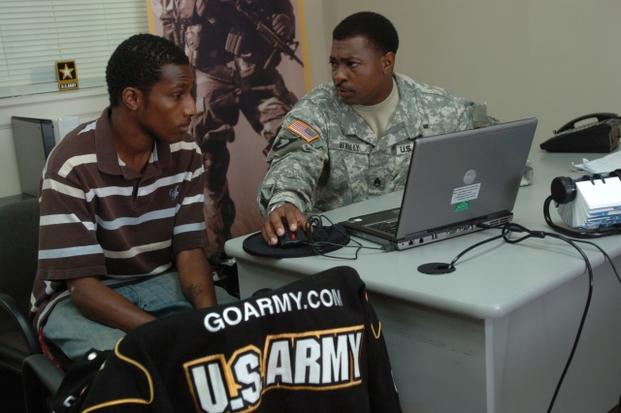When you walk into a military recruiter's office, you need to bring proof of identity, age, education, and other medical and legal documents if you are ready to enlist. If you are there just to ask a few questions in person, only bring a list of your questions and be ready to write down the information the recruiter gives you.
There is no need to join immediately when you first walk into the office. You want to make sure you have properly prepared your personal, professional and academic life for the process. There are frequent changes to the recruitment system at the Military Entrance Processing Stations (MEPS) and understanding them before you enlist is just smart.
If you make sure you know what you are interested in doing in the military before enlistment, that groundwork can be the difference in whether you enjoy your military career experience. Pick a job you want to do, then prepare for it by doing the research.
Here are a few suggestions for the military recruit:
1. Fitness. Do not join until you can ace a fitness test, especially if you want to go into challenging special ops selections after basic or boot camp. Do not expect military recruiters to prepare you physically for special ops-level training. Many recruits find that not meeting the physical requirements and the height and weight standards are two main causes for not being able to join.
2. Medical screening is another tough obstacle, and the military just made it harder to lie or omit medical information after Dec. 1, 2021. The DD 2807-2 pre-screening form inquires about your previous and current medical history. (Sample form)
After you fill out the pre-screening form with the recruiter and all looks good, you will go to MEPS. However, if the recruit has no glaring issues to report, passes the medical exam at MEPS, meets the height and weight standards, academic standards, legal and criminal standards, and scores well on the ASVAB test, there will be no need to pull the detailed medical records and dig any deeper.
3. New pharmacy record screening. The military can now pull your pharmacy records and see what prescriptions the doctor had you take for what reason and for how long. By doing so, it quickly uncovers any serious issues the recruit may have not submitted in the initial questionnaire.
For instance, medication records can lead the medical screeners to investigate when they see asthma inhalers, Hydrocodone or Adderall pop up on your history (especially if you did not disclose them). These are typically prescribed-for disqualifying respiratory issues, post-surgery medication, and ADD or ADHD.
Medications for anxiety and depression also can trigger more screening scrutiny. These are primarily what the search is seeking to find, as these are disqualifying issues that are easier to hide if omitted from the initial discussion.
Some of these medications can have a logical explanation, which you must be able to prove and provide. If you got your wisdom teeth removed, your dentist may have prescribed a red-flag medication like Hydrocodone. This would be a typical situation where a recruit could get waiver approval for the use of these drugs.
The new system is called the Prescription Medication Reporting System (PMRS) and is used to pull seven years of prescription histories for all civilian recruits going to MEPS. From this information, the medical screening process can determine what medicines were prescribed, who prescribed them and from where, and the dates of when these meds were prescribed or refilled.
4. Post MEPS disqualification: One of the most heartbreaking things happens after a recruit completes all the paperwork and preparation and then gets disqualified a few weeks or months prior to shipping off to basic or boot camp.
This can be an accident and no fault of the recruit, but it usually happens when the recruit does something risky or stupid to jeopardize their military career dreams. Most of the time, the disqualification is due to an alcohol-related incident, other legal trouble or dangerous training or sports that cause injury or surgery.
Be smart before you depart. Your behavior can change your eligibility even though you have passed the initial screening process. You are not officially in the military until you arrive at basic or boot-camp training, take the oath and complete your initial training.
Take this advice seriously. Many have lost the opportunity to serve within the last month of recruitment.
Stew Smith is a former Navy SEAL and fitness author certified as a Strength and Conditioning Specialist (CSCS) with the National Strength and Conditioning Association. Visit his Fitness eBook store if you're looking to start a workout program to create a healthy lifestyle. Send your fitness questions to stew@stewsmith.com.
Want to Learn More About Military Life?
Whether you're thinking of joining the military, looking for fitness and basic training tips, or keeping up with military life and benefits, Military.com has you covered. Subscribe to Military.com to have military news, updates and resources delivered directly to your inbox.


















